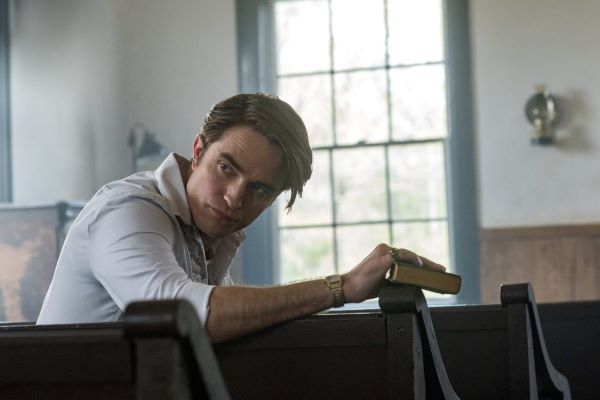Antonio Campos/ USA/ 2020/ 138 minutes
The town of Knockemstiff, Ohio may as well have a sign reading: Abandon all hope, ye who enter here, by its city limits. If novelist Donald Ray Pollock‘s jaundiced view of his hometown is to be believed, in the middle years of the 20th century, Knockemstiff was not a safe or happy place to be. Antonio Campos’ adaptation of Pollock’s debut novel takes us on a sprawling, star-studded tour through the black hearts and blacker secrets of the area. A town where the lawless, Hobbesian allure of the Wild West drifted south and lingered, it’s an interesting place to visit, but you would not at all want to live there. Even a mere 138 minutes may feel like too much dubious hospitality for the weary traveller.
The Devil All the Time covers roughly 20 years in the lives of the residents of Knockemstiff (very much a real place) and the surrounding areas, from around 1945 to 1965. There are three main strands. The first sees Willard Russell (Bill Skarsgård), a traumatised veteran of the second world war fall in love with waitress Charlotte (Haley Bennett). They marry and have a son, Arvin (Tom Holland), who becomes the central protagonist. Helen Hatton (Mia Wasikowska), who was seen as a potential match for Willard by his family, instead marries the evangelical preacher Roy Laferty (Harry Melling). Roy is a man given to pouring spiders over his head during sermons, as a sign of faith overcoming fear. He only gets madder from there. The third thread follows married couple Carl and Sandy Henderson (Jason Clarke and Riley Keough), who like to murder hitchhikers and pose for photos with the bodies.
Various characters weave in and out of this narrative braid, with Pollock himself acting as omniscient narrator. With his own chewy prose served up in a rich drawl – with just a hint of Hank Hill in the delivery – he comes across as a cruel deity dismissively amused by the pretensions to free will of his own creations. Whatever god his biblically-fixated puppets think they’re praying to, it isn’t the one actually giving them voice. Still, there is a certain bilious attraction to the doom-laden antics of the denizens of Knockemstiff, with many familiar faces playing against type, or flat out going for broke. Chief among these is the ever-game Robert Pattinson, who has by now not just laid the sparkly corpse of Edward Cullen to rest, but chopped it into pieces, buried it in the garden, and salted the earth. Playing a loathsome reverend with a disturbing taste for his young, nubile parishioners, he’s playing a constant push-me-pull-you of attraction and repulsion that dares you to go with it. With a deep-South accent almost as offensive as his character’s predilections, it’s his most out-there turn since the Dauphin in The King.
The main glaring flaw is that Campos seems uninterested in getting beneath the skin of his characters. At least, in anything other than the anatomical sense. Given the forensic, claustrophobic way Campos anchored the viewer into the churning mind of Christine Chubbuck in 2016’s Christine, the lack of motivation on display for most of the characters in The Devil All the Time is glaring. Without sometimes the most rudimentary of insights, the film often seems like a litany of pain and outrage for its own sake. It is beautifully shot pain and outrage to be sure, but pain requires a soul to really hit the target on any level beyond the visceral. There are nods to circumstantial factors – Willard’s trauma and grief is passed down to Arvin for example. But while Tom Holland gamely tries to fully spring his character from the page, we never have a complete grasp on what makes him tick. As for what drives Carl to murdering hitchhikers, we can only guess. Jason Clarke is given even less to work with, leaving the killer as one of a number of ciphers for pure evil.
The film is also glaringly retrograde in its treatment of its female characters. There is a growing area of discourse surrounding the proliferation in genre film and literature of female characters existing as nothing but plot catalysts, and The Devil All the Time is egregious on this front. In a film consisting entirely of aggressors and victims, its female characters are overwhelmingly the latter. Haley Bennett and Mia Wasikowska – superb actors both – are completely wasted as doomed, winsome wallflowers. Eliza Scanlen fares a little better as Arvin’s half-sister who succumbs to Pattinson’s grubby attentions; albeit as a similar figure of youthful, Pre-Raphaelite tragedy to her Beth March. Only Riley Keough as Sandy gets anything but scraps as a Myra Hindley-type accomplice to serial murder, but is again lacking in agency.
Both overstuffed and curiously desultory, The Devil All the Time has a crushing sense of doomed inevitability that may hit the spot to begin with, but lacks the genuine fire and brimstone of the best Southern Gothic. For sure, a film should be judged on its own separate merits from its source material, but something vital has failed to translate from the page. Perhaps it’s a sense of genuine transgression. For all the violence and nihilism, it still feels curiously safe; too stuffed with stars for it to be genuinely ugly. Let’s not kick our heels in Knockemstiff any longer than we have to.
Available to stream on Netflix now
